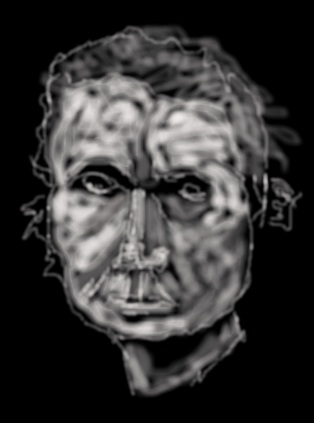The paradoxical double negative of the title I owe to Steve Martin’s “Atheists Don’t Have No Songs,” about atheists both having and not having music (in that his song itself contradicts their lack). In a previous post, I said that atheists deny anything so “openly religious” as a sacrifice, but that lack of openness opens the door for covertly religious imitations of sacrifice. Breaking something to make it sacred (the meaning of sacrifice) could only be credited by a materialist science (L5), if sacredness were an attribute that could be measured physically such as weight or height. Yet an idea as flattering as being made sacred (or as appealing as breaking other people for the public good) is not renounced just for lack of credibility.
The inspiration for the above picture of Madame Curie glowing in the dark, I owe to The Big Bang Theory, where Sheldon tries to encourage young women to become scientists so that they can die of radiation poisoning like her. His notion that such a fate would be desirable is obviously modeled on martyrdom, considered at one time the crown of a true Christian life.
As I had to split sacrifice at L4 (moralism) into two posts to do it justice–and moralism certainly deserves justice–so here I am following suit for equally deserving L5. Consequently, this post is a general introduction to ways sacrifice is sneaked in.
Ayn Rand was particularly adept at this, as in The Fountainhead, where an architect invites public condemnation and possible imprisonment for dynamiting a building he designed but which strayed from his plan. Despite this evocation of martyrdom, the book’s best known quote is about saints being “dangerous” because she believes virtue is selfishness.
Although agnosticism and atheism fit most neatly with scientific materialism, they are not the only expression of that level. Another expression, not necessarily atheistic and today largely associated with libertarianism, esteems the freedom from traditional restraints that L5 brings and makes it into the core value for which one should be willing to kill or die. The Cold-War version of this was “Better Dead than Red” and the Vietnam War’s “We must destroy the village in order to save it.”
In addition, there are various versions of sacrifice, really from lower Levels, but adopting L5 masks, most famously the German medical experiments. Even though there was a veneer of science to these, their motivation and methodology was an extreme form of L3 bullying. One group of experiments tortured Jewish and Roma subjects to show their inferiority, a standard practice in bullying. The other experiments served the war effort (a traditional L3 enterprise) by assessing how much harm a human body could survive under various circumstances. The latter might have yielded actual knowledge of value, but instead of hearing of that happening, all I have run across are reports of methodological errors and of Nazi scientists destroying their records for fear of prosecution. They were only willing to sacrifice other people’s lives for science, not their own. So those sacrificed were wasted. But then, what good have all the millions of other human sacrifices done throughout world history?


Your commentary on sacrifice for science reminds me of the ending theme of Portal. The lyrics of the song are ostensibly sung by GlaDOS, the tyranical AI who tortured people both with endless gauntlets in a deadly maze and with passive agressive communications, ostensibly because she was programmed to “test” people for science. After her defeat, this song plays:
It talks about the triumphs she died for, for “those who are still alive.”
Cool!